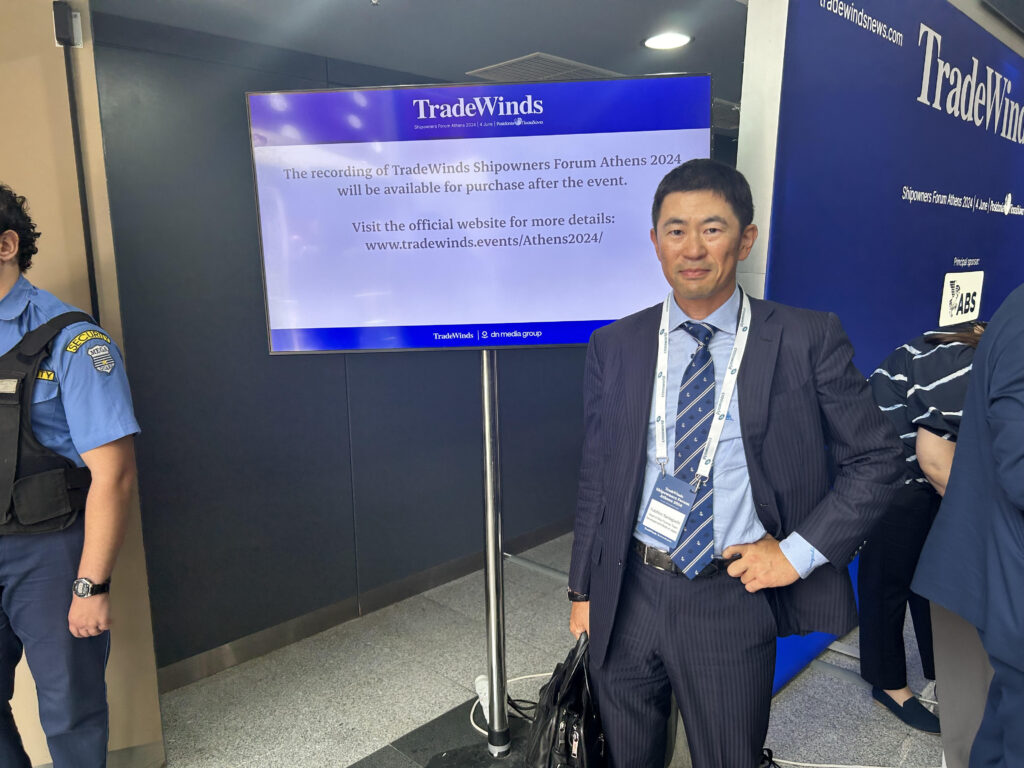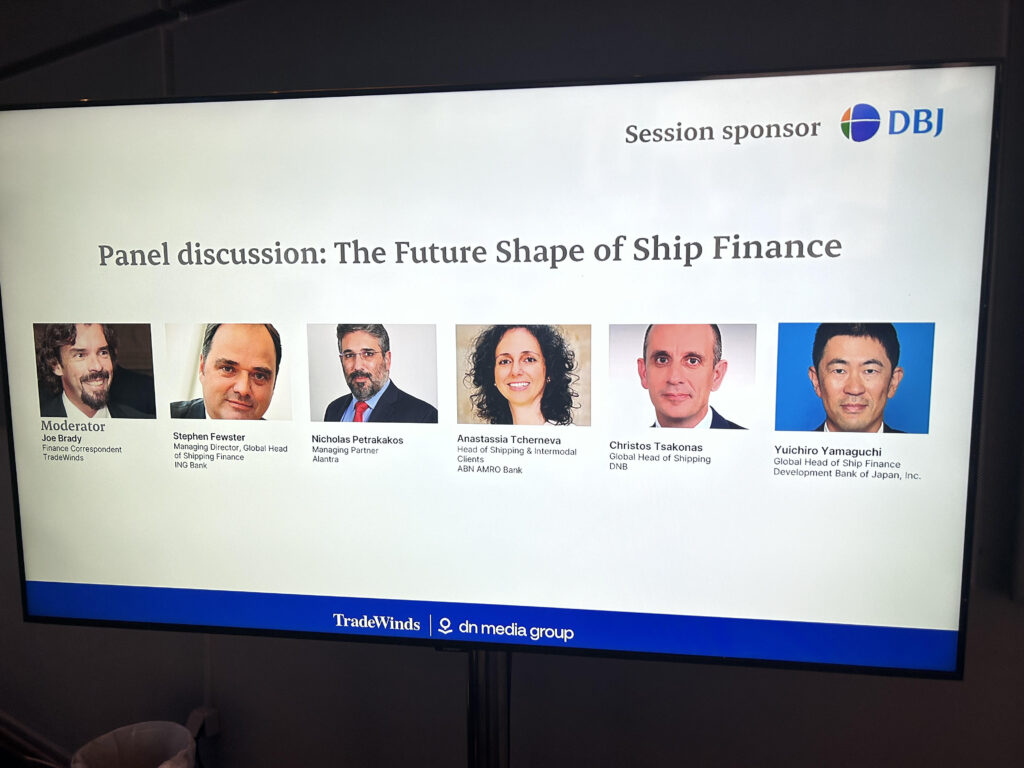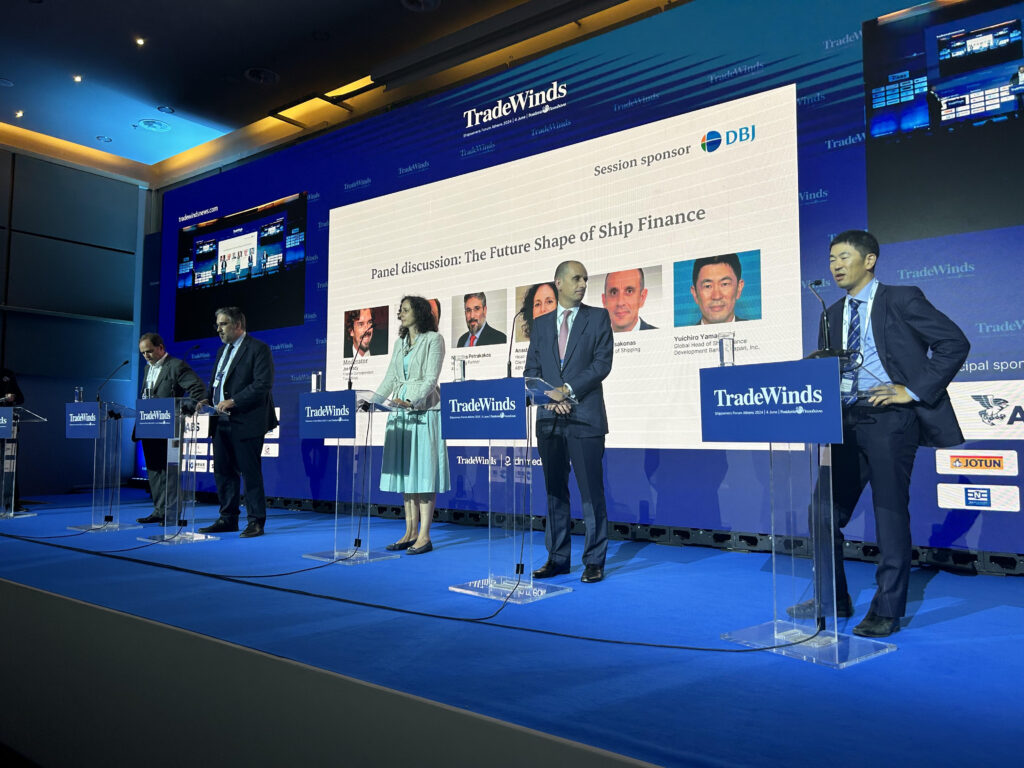
〆During his speech, Yamaguchi highlighted the robust demand for financing LNG vessels in Japan, underscoring the significant presence and influence of Japanese maritime stakeholders in the industry.
On the 4th day of Posidonia 2024, an international maritime exhibition held in Athens, Greece, the British newspaper Tradewinds hosted a conference. Yuichiro Yamaguchi, the Global Head of Shipping at the Development Bank of Japan (DBJ), participated as a speaker. Yamaguchi spoke about Japan’s demand for ship financing, stating:
“Last year, there was a surge in LNG (liquefied natural gas) projects, particularly centered around Qatar, which led to a strong demand for financing LNG vessels in Japan.”

The conference in which Yuichiro Yamaguchi participated was titled “The Future Shape of Ship Finance.” The Development Bank of Japan (DBJ) sponsored this panel session, one of the events at the Posidonia Maritime Exhibition, with Yamaguchi as a speaker.
Before the panel began, Yamaguchi spoke to the Japanese Maritime Newspaper, stating:
“Japan is one of the world’s leading maritime nations and a major shipbuilding country. It is important for me, as a Japanese representative, to explain Japan’s situation at the international conference of Posidonia, where many Greek shipowners and European maritime stakeholders gather.”
The panel featuring Yamaguchi included representatives from some of the world’s leading ship financing banks, such as DNB (Norway), ING Bank (Netherlands), ABN Amro (Netherlands), and Alantra Investment Bank (Spain).

Overall, ship financing in Europe appears to be performing well.
The European financial speakers stated:
“In cases where shipping companies are highly successful, with strong cash flows and predictable financing needs, many investors become interested. There is an active movement in fleet renewal and M&A (mergers and acquisitions), which also leads to external financing. We are also examining how ESG (environmental, social, and corporate governance) factors play a role in the banking products we offer.”
The understanding that the surge in new ship prices is dampening shipowners’ appetite for new orders was shared by Japanese maritime stakeholders.
“The perception that new ship prices are high is a major factor deterring shipowners from placing orders. Even considering the current inflationary environment, the price of new tankers is historically very high. This is a significant barrier to new ship orders from shipowners. It’s not necessarily a matter of banks’ lending decisions but rather the impact of rising prices,” remarked another speaker from a European financial institution.
Regarding future decarbonization efforts, there were the following opinions:
“If the decarbonization curve becomes steeper than expected by 2030, capital investment will increase, and the focus of costs will shift from OPEX (operating expenses) to CAPEX (capital expenditures). As a European bank, it is beneficial for us to maintain our position. If we successfully respond to Basel IV (the changes in international standards for bank capital requirements agreed upon by the Basel Committee on Banking Supervision), we will continue to support this decarbonization movement,” stated a speaker from a European financial institution.

Yamaguchi touched on the general situation of Japan’s shipping market, stating:
“Last year saw a significant increase in financing. The biggest reason was the massive LNG deals involving countries like Qatar. Japan’s banking sector is actively responding to financing needs.”
“Japanese megabanks are engaged in ship financing operations similar to international banks. At the same time, there are a considerable number of regional banks involved in ship financing in Japan. International competition is intense. Japan’s economy is not as strong as it once was and is somewhat stagnant,” he explained.
DBJ’s participation in the Tradewinds panel this time was highly significant. During the Posidonia Maritime Exhibition, numerous international conferences and opinion exchanges with Greek shipowners are held. However, opportunities for Japanese maritime stakeholders to appear as speakers are rare.
One participant shared their thoughts:
“I would like to hear more voices from Japanese maritime stakeholders. Mr. Yamaguchi’s appearance this time took great courage, especially amidst a panel dominated by Greeks and Europeans. At the same time, I believe it marked the first step for Japanese maritime stakeholders to participate in international conferences.”